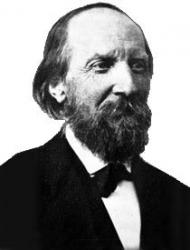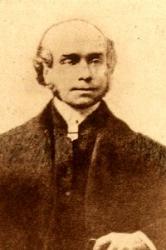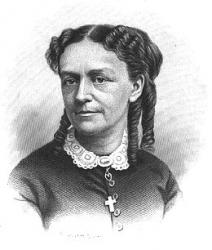Planning worship?
Check out our sister site, ZeteoSearch.org,
for 20+ additional resources related to your search.
- |
User Links
Person Results
‹ Return to hymnal



Export as CSV
Alessie B. Faussett
1841 - 1902 Person Name: Alassie B. Faussett Hymnal Number: 624 Author of "O Lamb of God, that takest away our sin" in Laudes Domini Faussett, Alessie, née Bond, daughter of the Rev. William Bond, Rector of Bailee, county of Down; born at Bailee Rectory, Jan. 8, 1841, and married to the Rev. Henry Faussett, Incumbent of Edenderry, county of Tyrone, 1875.
Her poetical works are (1) Thoughts on Holy Words, 1867, printed for private circulation; (2) The Triumph of Faith, 1870; (3) The Cairns of Iona, and other Poems, 1873.
Her hymns in common use include:—
1. Be with us all for evermore. For Divine Protection. Written in 1867, and first printed for private circulation in her Thoughts on Holy Words, 1867.
2. O Lamb of God, that tak'st away. Lent. Written in 1865, and first published in The Triumph of Faith, 1870.
These hymns were given in the Irish Church Hymnal, 1873. [George Arthur Crawford, M.A]
--John Julian, Dictionary of Hymnology (1907)
Alessie B. Faussett
Thomas Hill

1818 - 1891 Hymnal Number: 291 Author of "All holy, everliving One" in Laudes Domini Hill, Thomas, D.D., LL.D., son of English parents, was born at New Brunswick, New Jersey, Jan. 7, 1818. At the age of 20 he left the apothecary's shop in which he was employed, and began the study of Latin and Greek. He graduated at Harvard, 1843, and at the Cambridge Divinity School, 1845. His first charge was as pastor of the Unitarian Church at Waltham, Massachusetts; his second, that of President of Antioch College, Ohio, 1859; his third that of President of Harvard College, and his fourth that of pastor of "the First Parish in Portland, Maine, May 18, 1873." Dr. Hill has published numerous sermons, addresses, reviews, &c, and also a work— Geometry and Faith, 1849. Putnam (to whose Singers and Songs of the Liberal Faith we are indebted for this notice) says that he has "written or translated several hundred hymns or poems of decided excellence." These were mainly contributed to American magazines, the first having been printed in the Christian Register, in 1838. One of these, "All holy, ever living One" (God our Light), is in common use. Several others of decided merit are given in Putnam, 1875, pp. 411-19.
-- John Julian, Dictionary of Hymnology
Thomas Hill
W. B. Heathcote

1812 - 1862 Hymnal Number: 167 Author of "O Father, who didst all things make" in Laudes Domini Heathcote, William Beadon, B.C.I., was educated at New College, Oxford (B.C.l. 1840). He was for some time Fellow and Tutor of his College; Precentor of Salisbury Cathedral; Chaplain to the Bp. of Salisbury; and Select Preacher at Oxford. He was author of The Psalter pointed to the Gregorian Tones, and of Prayers for Children especially in Parochial Schools, with a Morning and. Evening Hymn, Oxford, 1846. The hymn is given in two forms, one for Morning and the second for Evening. It begins:—"O Father, Who didst all things make." Mr. Heathcote died in Aug. 1862.
-- John Julian, Dictionary of Hymnology
W. B. Heathcote
Rebekah H. M. Taylor
? - 1877 Hymnal Number: 380 Author of "My Savior, I would own thee" in Laudes Domini Taylor, Rebekah Hope, nèe Morley, eldest daughter of S. Morley, M.P., and wife of H. W. Taylor, a member of the Plymouth Brethren, is represented in the Enlarged London Hymn Book 1873, by:—
1. Blessed Saviour, I would praise Thee. Praise to Jesus.
2. My Saviour, I would own Thee. Steadfastness.
3. One more boundary passed o'er. New Year.
4. Thou art the Way, O Lord. The Way, Truth, and Life.
Mrs. Taylor died Nov. 8, 1877. Her Letters were published in 1878.
-- John Julian, Dictionary of Hymnology (1907)
Rebekah H. M. Taylor
Maria Frances (Hill) Anderson
1819 - 1895 Person Name: Maria F. Anderson Hymnal Number: 1063 Author of "Our country's voice is pleading" in Laudes Domini Anderson, Maria Frances. (Paris, France, January 30, 1819--October 13, 1895, Rosemont, Pennsylvania). Baptist. Daughter of Thomas F. Hill of Exeter, England. Married Rev. George W. Anderson, 1847. Author of several works on Baptists and missions for which she often used the pen name, L.M.N. Asked by George B. Ide, pastor of First Baptist Church, Philadelphia, to write a home mission hymn for the Baptist Harp (1849) in the same meter as Bishop Heber's "From Greenland's icy mountains." This hymn, "Our country's voice is pleading" was first sung in a home mission meeting at that Philadelphia church soon after the Baptist Harp was published. Another hymn appearing in the same collection and subtitled "The Bereaved Husband" begins "Yes she is gone, yet do not thou The goodness of the Lord distrust."
--Deborah Carlton Loftis, DNAH Archives
===========================================
Anderson, Maria Frances, born in Paris, France, Jan. 30, 1819, and married to G. W. Anderson, Professor in the University of Lewisburg, Pennsylvania. Two of her hymns are given in the Baptist Harp, 1849. Of these— "Our country's voice is pleading," has come into common use. [Rev. F. M. Bird, M.A.]
--John Julian, Dictionary of Hymnology (1907)
=================
Anderson, Maria Frances, née Hill, p. 67, i., is the daughter of Thomas F. Hill, of Exeter, England, and a Baptist. She published in 1853 Jessie Carey, and in 1861, The Baptists in Sweden.
--John Julian, Dictionary of Hymnology, Appendix, Part II (1907)
=================
Maria Frances (Hill) Anderson
Abby Hyde
1799 - 1872 Hymnal Number: 595 Author of "And canst thou, sinner, slight" in Laudes Domini Hyde, Abby Bradley, was born at Stockbridge, Massachusetts, Sept. 28, 1799, and married to the Rev. Lavius Hyde, of Salisbury, Mass., Sept. 28, 1818. She died at Andover, April 7, 1872. Her first poem, an Address to Mr. Wolfe, the Jewish missionary, appeared in a New Haven paper in 1822 or 1823, and from it Dr. L. Bacon (q.v.) took two hymns for his Hymns & Sacred Songs for the Monthly Concert, Andover, 1823. Those hymns have merit, but are not now in common use. Asahel Nettleton included 9 pieces by her in his Village Hymns, 1824, and 34 more were given in the revised and enlarged edition of the same, 1851. An additional hymn appeared in Nason's Congregational Hymn Book, 1857.
Of those hymns the following are still in common use:—
1. Ah, what can I a sinner do! Lent. From Nettleton's Village Hymns, 1824, in 5 stanzas of 4 lines, into a few collections.
2. And canst thou, sinner, slight! Grieve not the Spirit. From Nettleton's Village Hymns, 1824, in 4 stanzas of 4 lines, into a great number of American collections, and a few in Great Britain.
3. Behold the glorious dawning bright. Second Advent. From Nettleton's Village Hymns, 1824, in 4 stanzas of 4 lines. Limited in use.
4. Dear Saviour, if these lambs should stray. Prayer on behalf of children. In Nettleton's Village Hymns, 1824, in 4 stanzas of 4 lines. A touching hymn, and widely used.
5. Say, sinner, hath a voice within! Exhortation to Repentance. In a letter to Mr. Nason, dated July 10, 1857, Mrs. Hyde says that this hymn "was written down from my lips by a young sister, when I was not able to hold up my head from the pillow." It appeared in Nettleton's Village Hymns, 1824, in 6 stanzas of 4 lines, and is in extensive use.
All Mrs. Hyde's pieces in the Village Hymns are signed "Hyde." [Rev. F. M. Bird, M.A.]
-- John Julian, Dictionary of Hymnology
Abby Hyde
H. O. Knowlton
Hymnal Number: 885 Author of "I cannot tell if short or long" in Laudes Domini Knowlton, H. 0. Duffield notes under her hymn, "I cannot tell if short or long" (Trust), in Laudes Domini, 1884, that "Miss Knowlton was a school-girl in Illinois at the time of its composition. Professor W. F. Sherwin received it from her through the good offices of one of her teachers, a mutual friend " (English Hymns, 1886, p. 238).
--John Julian, Dictionary of Hymnology, Appendix, Part II (1907)
H. O. Knowlton
Phoebe A. Hanaford

1829 - 1921 Hymnal Number: 890 Author of "Cast thy bread upon the waters Thinking not 'tis thrown away" in Laudes Domini Hanaford, Phoebe A., née Coffin, daughter of George F. Coffin, was born at Nantucket Island, May 6, 1829. Mrs. Hanaford is an Universalist, and one of their recognized ministers. Her hymn "Cast thy bread upon the waters" (Work and Wait), is in the Laudes Domini, N.Y., 1884, and other American collections.
--John Julian, Dictionary of Hymnology, Appendix, Part II (1907)
=================
Born: May 6, 1829, Nantucket Island, Massachusetts.
Died: June 2, 1921, Rochester, New York.
Daughter of Quaker ship owner George F. Coffin, Phoebe was cousin to feminist Lucretia Mott. A gifted writer, she was published in the local paper by the time she was a teenager. She studied Latin and mathematics and taught school for a few years, then in 1849 married Dr. Joseph H. Hanaford. The couple lived in Newton and Reading, Massachusetts, and had two children. Phoebe continued her literary efforts, producing poetry, children’s stories, essays, and biographies (her biography of Abraham Lincoln sold 20,000 copies). She also edited a Universalist magazine, and, urged by Rev. Olympia Brown, she eventually became a Universalist minister (the first woman ordained in New England). She served churches in Hingham and Waltham, Massachusetts; New Haven, Connecticut, and Jersey City, New Jersey. Her works include:
Life of George Peabody
Women of the Century (Boston, Massachusetts: B. B. Russell, 1877)
www.hymntime.com/tch
Phoebe A. Hanaford
Caroline E. May
1808 - 1873 Hymnal Number: 580 Author of "O Savior, where shall guilty man" in Laudes Domini May, Catherine Elizabeth, née Martin, p. 1584, i., under "O Saviour," &c. She was the only daughter of Sir Henry William Martin, Bt, and was b. at Lockinge Park, near Wantage, Feb. 19, 1808; m. 1837 to the Rev. George May, who was from 1843 to 1861 Vicar of Lyddington, Wilts; died at Totland, Isle of Wight, Sep. 12, 1873. The first verse of her hymn, "O Saviour, where shall guilty man," appeared in Dr. Maurice's Choral Harmony, 1858, set to a tune called "Lyddington." which was composed by Dr. E. F. Rimbault, and is dated 1856. [Rev. James Mearns, M.A.]
--John Julian, Dictionary of Hymnology, New Supplement (1907)
Caroline E. May


 My Starred Hymns
My Starred Hymns


